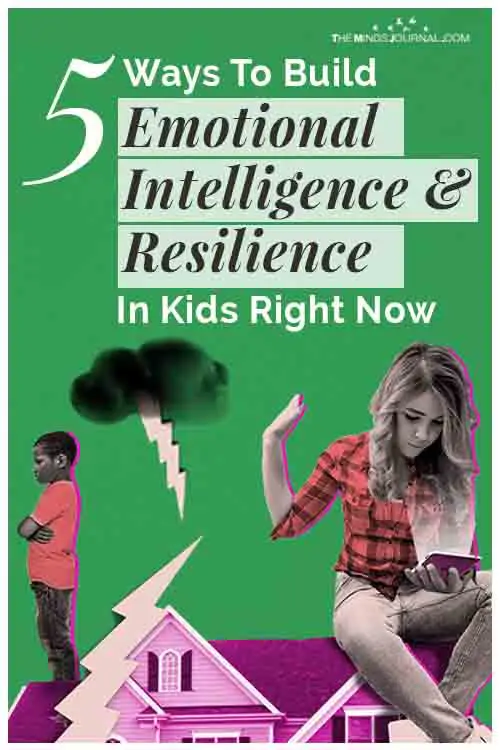Parenting during a pandemic is tough. Here’s how to help your kids develop emotional intelligence and resilience.
Families are a system of human beings who are intimately attached and bonded. Family systems are the school in which emotional learning occurs. This includes building resilience in your children.
This pandemic is an opportunity to improve the emotional intelligence in your children, which is more valuable than anything you could ever give them or anything they could ever learn at school.
Right now, parents need to let go of high standards or unrealistic expectations for themselves and their kids and acknowledge that being a parent, in general, is a hard albeit rewarding task.
As a caregiver, your number one motive is to keep your family physically safe and emotionally secure. Frankly, this should always be your number one motive, but it’s especially true during this time of crisis.
Children will explicitly remember the pandemic for the rest of their lives if they are three or older. It’s a formative experience that will shape and inform many aspects of their development.
Like you, children have lost their schedules and in-person playtime with friends. Their little worlds are turned upside-down and they don’t have a template to deal with the emotional fallout the way you do.
You want to make relational and emotional deposits to raise your family’s emotional capital, so your family has the resources to deal with the acute stress that is inevitable during this coronavirus pandemic and other major challenges along the way in life.
How do you do that?
Here are 5 ways you can build your child’s emotional intelligence and resilience during the coronavirus lockdown.
1. Meet their emotional needs.
As a caregiver, you are the child’s “Chief Emotional Officer,” so try to meet their emotional needs and teach them how to manage their emotions.
Cabin fever is real; of course, children are acting out.
When your child feels an emotion, try not to judge it or criticize it. Instead, name, validate, and soothe it with these simple steps:
Name it.
Let your child name the emotion they’re feeling. You can also help them reflect by by saying, “I see tears. Are you sad or angry?” These are two very common emotions for children that are often denied.
Validate it.
“I hear you’re feeling…” Then, get curious. “What caused you to feel …?” “Tell me more …” “Where do you feel it in your body?”
Soothe it.
If necessary, soothe their emotions with empathy.
Read on to know 3 Tips To Help Your Child Navigate Difficult Emotions
An empathic response allows children to know it is safe to express how they feel. This is called “feeling felt” or attuning to your child. Invalidating children’s emotions communicates that it’s not OK for them to be who they are.
Here’s the good news: You only have to attune to your children 30 percent of the time to get good results, so release the need to engage in perfect parenting.
2. Define your family’s core values.
One mental resource you can create as a family is to collaborate on your core values. Values are important to define during this time because everything has been stripped away from you, but you can always come back to your core values.
Values are chosen qualities that the family defines as important and meaningful. This can be honesty, integrity, speaking kindly, and so forth.
Related:15 Enlightening TED Talks on Emotional Intelligence
Many times families have core values that are implicit and indirectly understood, but your family should explicitly define what your values are. You can do this with younger children more easily than teenagers.
Ask your children, “Who is your hero or heroine? What are the qualities this person has?” This exercise helps children define their values by externalizing; it makes values real for them.
Once your family has defined their core values, they can serve as a map used to navigate those difficult moments throughout this time and build emotional intelligence.
For example, if a core value is honesty, you can refer to that when your child lies about something.
Related video:
3. Set examples when you can.
When your kids (or you and your partner) act out, turn it into a teaching moment to demonstrate how to repair ruptures in relationships.
Teach your children that ruptures and repairs occur in all relationships.
When there is a rupture (for example, “He hit me first!”), teach your offending child how to take responsibility for their actions. Then demonstrate how to repair the rupture (forgive) to whoever was hurt by the behavior so that can develop emotional intelligence and resilience.
You can teach them the steps they need to take — recognition, responsibility, remorse, and repair — in order to move past it. This will help them develop emotional intelligence and resilience.
4. Teach them how to communicate.
Make a deposit into the family’s “emotional bank” by teaching your children how to communicate.
I like Marshal Rosenberg’s “Non-Violent Communication” for this. Teach kids how to clearly express what they need, feel, or want without blaming or criticizing.
Instead of “She made me,” teach them to speak from the “I” perspective.
A child is never too young to start learning about boundaries. Even though this is a tough time, it’s OK to say no to them.
5. Limit screen time.
Research shows there isn’t a firm “right” amount, and that more active forms of screen time, like cooperative and team-oriented video games, can actually have positive effects on your mental well-being.
This is especially important right now because the internet is the world’s best tool for distanced socializing. Like all tools, your new tech tools have to be used with proper care, attention, and responsibility.
Related: How Screen Time Affects Quality Of Sleep And Overall Health of Young Adults
There are hundreds of new and timeless video games that parents and kids can play together. And there are countless favorite films now perfectly positioned to be passed down that don’t just entertain or distract but teach ineffable lessons about life, love, and family and build emotional intelligence and resilience.
If you want to become more informed on the pros and cons of screen time for children and adolescents, UCLA researcher Dr. Yalda Uhls has written an awesome, very easy to read book for parents, “Media Moms & Digital Dads.”
Research shows it takes five positive interactions with loved ones to make up for one negative interaction. Keep this in mind when you feel the frustration bubble up. Try and tap into the joy of parenting instead of the job of parenting.
Related: This Emotional Intelligence Quiz Reveals How Psychic You Are!
What other ways do you know to build emotional intelligence and resilience in kids? Leave a comment and share it with your friends.
Written by: Nadine Macaluso
Originally appeared on: Your Tango









Leave a Reply
You must be logged in to post a comment.